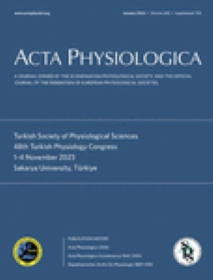全体会议和主题摘要
IF 5.6
2区 医学
Q1 PHYSIOLOGY
引用次数: 0
摘要
本文章由计算机程序翻译,如有差异,请以英文原文为准。
Plenary and keynote abstracts
The increasing prevalence of obesity, prediabetes and type 2 diabetes (T2D) emphasizes the need for a more complete understanding of the mechanisms mediating glucose homeostasis to accelerate the identification of new medications to prevent conversion to T2D. Recent reports indicate that former obesity medication, 5-hydroxytryptamine (5-HT, serotonin)2C receptor (5-HT 2C R) agonist lorcaserin improves glycemic control in association with weight loss in obese patients with T2D. We examined whether lorca-serin has a direct effect on insulin sensitivity and how this effect is achieved. We clarify that lorcaserin dose-dependently improves glycemic control in a mouse model of T2D without altering body weight. Examining the mechanism of this effect, we reveal a necessary and sufficient neuro-chemical mediator of lorcaserin’s glucoregulatory effects, via activation of brain pro-opiomelanocortin (POMC) peptides. We observed that lorcaserin reduces hepatic glucose production and improves insulin sensitivity. The recent large scale clinical trial CAMELLIA-TIMI 61 revealed that lorcaserin prevented conversion to T2D and improved T2D and supports the translational relevance this medication for prediabetes and T2D treatment. Taken together, these data suggest that lorcaserin’s action within the brain represents a mechanistically novel treatment for prediabetes and T2D: findings of significance to a prevalent global disease.
求助全文
通过发布文献求助,成功后即可免费获取论文全文。
去求助
来源期刊

Acta Physiologica
医学-生理学
CiteScore
11.80
自引率
15.90%
发文量
182
审稿时长
4-8 weeks
期刊介绍:
Acta Physiologica is an important forum for the publication of high quality original research in physiology and related areas by authors from all over the world. Acta Physiologica is a leading journal in human/translational physiology while promoting all aspects of the science of physiology. The journal publishes full length original articles on important new observations as well as reviews and commentaries.
 求助内容:
求助内容: 应助结果提醒方式:
应助结果提醒方式:


